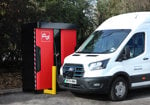Used cars: Caution is still needed in the used car market
by Mike Pilkington, managing director, Manheim Auctions & Remarketing
 The extraordinary surge in wholesale demand so far this year has taken most of the market by surprise and Manheim is still urging caution as retail dealers settle down to the task of finding customers for this stock.
The extraordinary surge in wholesale demand so far this year has taken most of the market by surprise and Manheim is still urging caution as retail dealers settle down to the task of finding customers for this stock.
There is no doubt that dealers had reduced their stocks pre-Christmas and a lot of this current demand has been driven by the need to replenish empty forecourt spaces.
Although there appears to be healthy consumer interest, it remains to be seen just how long this will last.
We have also seen many new trade buyers coming to auction and this has contributed to the huge rise in auction conversion rates and, of course, the more buyers bidding, the higher the prices.
With good attendances in both the auction halls and online combined with vendors being more realistic when setting reserves, trade buyers and ‘end user’ buyers are responding and values are on the increase.
February remains positive; the only doubt surrounds the volume of de-fleeted vehicles coming into the wholesale market over the coming weeks.
That said, any reduction in supply may strengthen current market activity and values further.
With so many unknowns, sensible predictions for 2009 are somewhat difficult.
However, if consumer credit restrictions are eased, if dealer network casualties are minimised, if there are no other unforeseen market influences and if consumer demand for used vehicles remains stable, then I believe that prices will likely remain flat for most of the year with the possibility of a price recovery towards the end of the year.
Economic climate: Difficult times will result in a stronger sector
by Roddy Graham, commercial director, Leasedrive Velo Group
 As any wise investor will advise, you should never place all your eggs in the same basket.
As any wise investor will advise, you should never place all your eggs in the same basket.
Those contract hire companies that based their future book values solely on Monitor values are now suffering the consequences of their actions.
Only those players who invested diligently in internal and external data sources and professional expertise can have come up with realistic values.
While even the best of them will not be best placed, their exposure will be a lot better than some, who must be reeling under the impact.
Astute asset management has always been a key factor for a successful contract hire company.
Never has this been truer than in these times.
Maintaining secure funding lines is also the lifeblood of any business. Without the necessary finance, you cannot do business.
With bad news from the world’s largest vehicle manufacturer fighting for its survival to a major vehicle rental company closing its UK head office, you could be forgiven for wondering, where is it all going to end?
Inevitably, there will be casualties but also serious business opportunities.
Serious players may yet show an investment appetite which will result in growth through acquisition.
Times like these sort the wheat from the chaff and a period of consolidation will inevitably result in a stronger sector.
You either see your glass as half empty or half full.
I always subscribe to the latter view.
I also coined a phrase which I feel could not be more apt in the current situation. “The future isn’t what it used to be.”
Salary sacrifice: An attractive proposition for employers and staff
by Andrew Cope, chief executive, Zenith Provecta
 Salary sacrifice has come of age.
Salary sacrifice has come of age.
After being used effectively in the employee benefits arena for childcare and pensions, the fleet industry is waking up fast to the advantages of this method of funding cars for employees.
The attraction of salary sacrifice is clear, as it allows the employee to save on income tax, VAT and National Insurance contributions.
These savings are usually greater than any benefit-in-kind tax.
The employer is able to provide an improved benefit to staff at no cost to themselves, as the full cost is met by the employee.
In 2009, the tax breaks available for vehicles with low CO2 emissions, as well as the substantial discounts for fleet purchases, make buying company cars through salary sacrifice an attractive proposition.
As a funding method, it works for many of the reasons that Employee Car Ownership (ECO) does – tax efficiencies and flexibility of choice.
Organisations can offer a great company car benefit to any employee that meets their eligibility criteria, especially those who take “cash in lieu” or who would not normally qualify for a company car, at no cost to themselves.
It also provides a structure around cash-for-car schemes that can be designed to meet health and safety obligations and encourage employees to drive low-emission vehicles.
The scheme can be extended to all employees as a cost-effective way to purchase a private car.
It will not be suitable in every case.
But the cost savings, benefits to employees and the health and safety reassurances mean that salary sacrifice is likely to be bigger and quicker than ECO.
















Login to comment
Comments
No comments have been made yet.